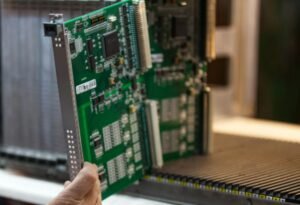Artificial Intelligence
Artificial Intelligence (AI) is a branch of computer science that aims to create intelligent machines capable of performing tasks that normally require human intelligence. These machines are designed to simulate human cognitive processes and solve complex problems in a more efficient manner. AI has become an integral part of various fields, from healthcare to finance and entertainment. As technology advances, AI continues to transform the way we live and work.
Key Takeaways:
- Artificial Intelligence (AI) aims to create intelligent machines capable of human-like tasks.
- AI is widely used in different industries, including healthcare and finance.
- Advancements in AI technology continue to reshape our lives and work.
Understanding Artificial Intelligence
AI systems are designed to perceive their environment, understand and interpret data, learn from experiences, and make decisions or take actions based on the available information. These systems can be classified into two main categories: Narrow AI and General AI. Narrow AI refers to systems that are focused on specific tasks, such as voice recognition or playing chess. On the other hand, General AI aims to possess human-like intelligence and perform a wide range of tasks. While General AI is still a concept in development, Narrow AI is already extensively used in various applications.
AI systems are capable of perceiving their environment and making decisions based on available information, enabling them to perform a wide range of tasks.
Applications of Artificial Intelligence
Artificial Intelligence has numerous applications across different industries. Some of the key areas where AI is making a significant impact include:
- Healthcare: AI is being utilized for disease diagnosis, drug discovery, personalized medicine, and robotic surgeries.
- Finance: AI-powered algorithms are employed for fraud detection, automated trading, risk assessment, and credit scoring.
- Customer Service: AI chatbots and virtual assistants are revolutionizing customer support by providing quick and accurate responses.
- Entertainment: AI is used for content recommendation, video game character behavior, and virtual reality experiences.
- Transportation: Self-driving cars, traffic prediction models, and smart transportation systems are a few examples of AI advancements in the transportation sector.
AI is transforming various industries, from healthcare and finance to customer service and transportation, enhancing efficiency and enabling new possibilities.
The Future of Artificial Intelligence
The rapid advancements in AI technology have the potential to bring about significant changes in the future. Here are some possible developments:
- Improved Automation: AI-powered machines and robots will automate repetitive and mundane tasks, allowing humans to focus on more complex and creative work.
- Enhanced Personalization: AI will further refine personalization by analyzing vast amounts of data to provide tailored recommendations and experiences.
- Ethical Challenges: As AI becomes more advanced, ethical considerations regarding privacy, security, and bias need to be addressed by developers and policymakers.
The future of AI holds promises of enhanced automation, personalized experiences, and ethical considerations for developers and policymakers.
Interesting Data Points
| Industry | AI Adoption Percentage |
|---|---|
| Healthcare | 75% |
| Finance | 65% |
| Retail | 60% |
| Jobs at Risk | Percentage |
|---|---|
| Transportation and Logistics | 55% |
| Manufacturing | 45% |
| Customer Service | 35% |
| Country | AI Investment (in billions) |
|---|---|
| United States | 9.3 |
| China | 7.9 |
| United Kingdom | 1.9 |
Artificial Intelligence is shaping the world we live in and is poised to have an even greater impact in the future. By leveraging AI technologies, industries can achieve improved efficiency, enhanced personalization, and innovative solutions. However, as AI continues to advance, it is crucial to address ethical concerns and ensure responsible development and implementation.
With the ongoing progress in AI research and development, we can expect to witness exciting breakthroughs in the near future. As AI becomes an integral part of our society, understanding its potential, limitations, and implications is essential for harnessing its power for the benefit of humankind.
Common Misconceptions
Misconception 1: AI will replace humans completely
There is a common misconception that Artificial Intelligence will completely replace humans in various industries. While AI technologies have the potential to automate repetitive tasks and improve efficiency, they are unlikely to completely replace human workers. AI systems are designed to complement human capabilities and enhance productivity rather than replace human skills and judgment.
- AI can enhance decision-making by providing insights and analysis.
- AI relies on human input and oversight to function effectively.
- AI can create new job opportunities and reshape existing roles.
Misconception 2: AI is all about robots
Another common misconception is that AI is solely about robots or humanoid machines. While robots are one application of AI, artificial intelligence goes beyond physical bodies and encompasses a wide range of technologies and algorithms. AI can be found in various software systems, virtual assistants, recommendation engines, and even within the infrastructure of online platforms.
- AI is present in voice assistants like Siri and Alexa.
- AI is used in recommendation systems to personalize content.
- AI algorithms are integrated into social media platforms to analyze user behavior.
Misconception 3: AI is only for tech companies
Many people perceive AI as a technology exclusively relevant to large tech companies. However, AI has applications across multiple industries and sectors, including healthcare, finance, transportation, and agriculture. AI technology has the potential to revolutionize various processes, increase efficiency, and improve outcomes in a wide range of fields.
- AI can be used in medical diagnosis to detect diseases and assist in treatment planning.
- AI can automate financial tasks such as fraud detection and risk assessment.
- AI can optimize transportation routes to minimize fuel consumption and reduce emissions.
Misconception 4: AI will surpass human intelligence
Contrary to popular belief, AI is not expected to surpass human intelligence in the near future. While AI systems can perform specific tasks with high accuracy and efficiency, they lack the general intelligence and cognitive abilities possessed by humans. Although AI continues to advance, it is still far from achieving human-level intelligence.
- AI systems lack common sense and emotional intelligence.
- AI cannot fully understand and comprehend the nuances of human language and cultural contexts.
- AI operates within predefined boundaries and cannot exhibit creativity or intuition like humans.
Misconception 5: AI is always objective and unbiased
There is a misconception that AI systems are always objective and free from biases. However, AI technologies are only as good as the data they are trained on, and biased or incomplete datasets can lead to biased AI outputs. Additionally, AI algorithms can reflect the biases implicitly present in society, potentially leading to discriminatory outcomes.
- AI can amplify existing societal biases if not carefully designed and monitored.
- AI may struggle with fairness in decision-making due to biased training data.
- AI should be continuously evaluated and adjusted to mitigate potential bias and ensure ethical outcomes.
Applications of Artificial Intelligence in Healthcare
Artificial intelligence (AI) has revolutionized the healthcare industry by assisting in diagnosis, enhancing patient care, and improving overall efficiency. The following table provides an overview of some notable applications of AI in healthcare:
| Application | Description | Benefits |
|---|---|---|
| Early Disease Detection | AI algorithms analyze patient data, such as medical images or genetic information, to identify early signs of diseases | Improves prognosis and treatment success rates |
| Drug Discovery | AI accelerates the process of drug development by predicting a drug’s effectiveness, toxicity, and identifying potential targets | Reduces costs and time for drug discovery |
| Virtual Nursing Assistants | AI-powered virtual assistants provide round-the-clock support to patients, monitoring their conditions and offering guidance | Enhances patient engagement and reduces healthcare workload |
| Robot-Assisted Surgery | AI robots assist surgeons in performing complex surgeries with precision and efficiency | Reduces human error and enhances surgical outcomes |
| Smart Electronic Health Records | AI systems automatically analyze patient records, extract important information, and provide actionable insights | Facilitates personalized treatment plans and enhances data management |
| Genomic Analysis | AI algorithms analyze large sets of genetic data to identify patterns and mutations associated with diseases | Improves precision medicine and personalized treatment |
| Remote Patient Monitoring | AI sensors and wearable devices continuously monitor patient vitals and alert healthcare providers in case of emergencies | Enables proactive healthcare and reduces hospital readmissions |
| Medical Image Analysis | AI algorithms analyze medical images, such as X-rays and MRI scans, to assist in faster and accurate diagnosis | Improves efficiency and reduces diagnostic errors |
| Smart Health Assistants | AI-powered chatbots provide patients with personalized health advice, answer questions, and schedule appointments | Improves patient access to healthcare and reduces administrative burden |
| Health Monitoring Apps | AI-driven mobile applications enable individuals to track and manage their health conditions, providing real-time insights | Promotes proactive healthcare and self-management |
Artificial Intelligence and Education
The integration of artificial intelligence (AI) in education has brought about transformative changes in the learning process, personalized instruction, and assessment methods. The following table showcases some key areas where AI is being applied in education:
| Application | Description | Benefits |
|---|---|---|
| Intelligent Tutoring Systems | AI-powered systems provide personalized instruction, adapt to the student’s learning pace, and offer targeted feedback | Enhances student engagement and learning outcomes |
| Automated Grading | AI algorithms evaluate student assignments, tests, and essays to provide immediate feedback and grading | Reduces time spent on grading, allows faster feedback, and ensures consistency |
| Smart Content Creation | AI tools assist in content creation by generating tailored learning materials, quizzes, and interactive simulations | Enables personalized and adaptive learning experiences |
| Virtual Reality Learning | AI-powered virtual reality platforms create immersive educational experiences, enhancing understanding and knowledge retention | Fosters experiential and engaging learning environments |
| Adaptive Learning Platforms | AI systems analyze student performance data to dynamically adjust the learning path and resources to meet individual needs | Promotes personalized learning and maximizes student potential |
| Student Support Systems | AI chatbots offer 24/7 support to students, answering questions, providing guidance, and assisting with administrative tasks | Improves accessibility to educational resources and support |
| Big Data Analytics | AI algorithms analyze vast amounts of educational data to identify trends, improve instructional strategies, and predict student performance | Informs evidence-based decision-making and enhances educational outcomes |
| Language Acquisition Tools | AI-powered language learning applications offer personalized language instruction, speech recognition, and translation assistance | Facilitates language acquisition and cultural understanding |
| Automated Attendance Tracking | AI systems automatically track and manage student attendance, reducing manual recording and administrative burden | Streamlines administrative tasks and improves accuracy |
| Emotion Recognition | AI technologies recognize and respond to students’ emotions, offering tailored support and adjusting teaching methods accordingly | Enhances student well-being and engagement |
Artificial Intelligence and Finance
The financial industry has adopted artificial intelligence (AI) technologies to improve efficiency, enhance customer experience, and enable predictive analytics. The table below highlights notable applications of AI in finance:
| Application | Description | Benefits |
|---|---|---|
| Fraud Detection | AI algorithms analyze vast amounts of financial data to identify patterns indicative of fraudulent activity | Reduces financial losses and enhances security |
| Algorithmic Trading | AI-driven trading systems analyze market data, make informed investment decisions, and execute trades automatically | Improves trade execution speed and accuracy |
| Customer Service Chatbots | AI-powered chatbots handle customer inquiries, provide assistance, and offer personalized banking recommendations | Enhances customer satisfaction and reduces response times |
| Credit Scoring | AI models assess creditworthiness based on various data points, enabling faster loan approvals and risk mitigation | Streamlines lending processes and reduces default rates |
| Risk Assessment | AI algorithms analyze historical data to assess potential risks and predict market fluctuations | Improves risk management and portfolio optimization |
| Robo-Advisors | AI-powered platforms offer tailored investment advice and automated portfolio management based on individual goals and risk tolerance | Provides cost-effective investment solutions and broadens access to financial advice |
| Predictive Analytics | AI models analyze customer data to predict future behaviors and preferences, enabling personalized marketing campaigns | Increases customer engagement and improves conversion rates |
| Financial Market Research | AI systems analyze news, social media, and market data to generate actionable insights for investment decision-making | Supports informed investment strategies and reduces information asymmetry |
| Cybersecurity | AI technologies monitor networks, detect anomalies, and swiftly respond to cyber threats to safeguard financial institutions | Enhances data protection and prevents financial fraud |
| Smart Contract Automation | AI-enabled smart contracts automatically execute predefined conditions, ensuring secure and efficient transactions | Reduces dependencies on intermediaries and enhances transactional transparency |
Artificial Intelligence in Autonomous Vehicles
Artificial intelligence (AI) plays a vital role in the development of autonomous vehicles by enabling accurate perception, decision-making, and control systems. The following table highlights key AI applications in autonomous vehicles:
| Application | Description | Benefits |
|---|---|---|
| Sensor Fusion | AI algorithms combine data from various sensors, such as cameras, lidar, and radar, to create a comprehensive environment perception | Enhances object detection and increases driving safety |
| Path Planning | AI models generate optimal driving paths by considering traffic rules, road conditions, and real-time sensor data | Improves navigation efficiency and reduces traffic congestion |
| Behavior Prediction | AI systems analyze surrounding objects and predict their future behavior to make informed driving decisions | Enhances anticipatory driving and accident avoidance |
| Advanced Driver Assistance | AI-powered systems provide real-time warnings, adaptive cruise control, and emergency braking to assist human drivers | Increases driving safety and reduces human error |
| Natural Language Processing | AI understands and responds to voice commands, enabling hands-free control of navigation, entertainment, and communication systems | Enhances user experience and reduces driver distractions |
| Mapping and Localization | AI algorithms create high-definition maps, localize vehicles precisely, and enable accurate localization in different driving conditions | Ensures accurate navigation and lane positioning |
| Simulation and Testing | AI-based simulations enable extensive testing in virtual environments, ensuring the safety and reliability of autonomous systems | Reduces the need for physical testing and accelerates development cycles |
| Traffic Sign Recognition | AI models accurately detect and interpret traffic signs to provide contextual information and assist in driving decisions | Improves compliance with traffic regulations and driving safety |
| Vehicle-to-Vehicle Communication | AI facilitates communication between autonomous vehicles, enabling cooperative strategies and enhancing traffic flow | Improves road safety and optimizes traffic management |
| Decision-Making Systems | AI models interpret sensor data, prioritize actions, and make real-time decisions to safely navigate complex driving scenarios | Enables reliable and efficient autonomous driving |
Artificial Intelligence in Customer Service
Artificial intelligence (AI) has transformed customer service by offering personalized interactions, enhancing response times, and improving overall customer satisfaction. The table below showcases some applications of AI in customer service:
| Application | Description | Benefits |
|---|---|---|
| Chatbots | AI-powered chatbots offer instant responses to customer inquiries, provide product recommendations, and assist with troubleshooting | Enhances 24/7 customer support and reduces wait times |
| Sentiment Analysis | AI algorithms interpret customer feedback and sentiment to identify their emotions and improve service interactions | Enables personalized responses and proactive customer engagement |
| Virtual Assistants | AI virtual assistants, powered by natural language processing, handle customer requests, schedule appointments, and offer personalized help | Enhances self-service options and reduces human agent workload |
| Call Routing | AI systems analyze customer inquiries and direct them to the most appropriate human agent, improving call resolution and efficiency | Reduces customer frustration and improves agent productivity |
| Customer Insights | AI-driven analysis of customer data provides actionable insights into preferences, behavior, and enables personalized marketing | Enables targeted marketing campaigns and enhances customer loyalty |
| Speech Recognition | AI technologies accurately convert speech into text, facilitating voice-activated customer service and transcription services | Improves accessibility and customer convenience |
| Recommendation Systems | AI algorithms suggest personalized products or services based on customer behavior, preferences, and historical data | Increases cross-selling opportunities and customer satisfaction |
| Issue Resolution | AI systems analyze customer complaints, suggest solutions, and offer self-service resources to address common problems | Reduces resolution times and improves customer experience |
| Customer Churn Prediction | AI models analyze customer behavior and characteristics to predict churn probability, enabling proactive retention strategies | Reduces customer attrition rates and improves retention |
| Social Media Monitoring | AI tools monitor social media platforms and detect customer mentions, allowing prompt responses to enhance brand reputation | Improves brand perception and customer engagement |
Artificial Intelligence in Manufacturing
Artificial intelligence (AI) has transformed the manufacturing industry through increased automation, quality control, and predictive maintenance. The following table highlights key applications of AI in manufacturing:



